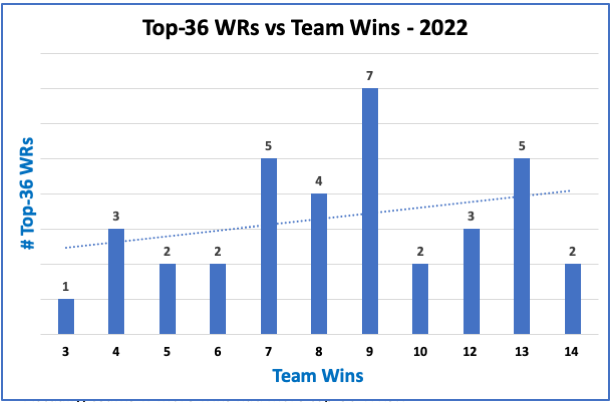Garbage Time Fantasy Scoring
It has long been understood there is fantasy scoring to be found on offenses attached to bad defenses. The idea is those teams will be trailing so much they’ll throw more and provide a cheap source of fantasy production, especially the wide receivers. But does the data actually support that? I had my doubts, so I looked at some recent data to try to figure it out. My suspicion was that some teams aren’t on the field enough to score points. I also suspected others try to run the ball to give their D a rest and burn some clock. Let’s see what the data says.
Bad Defenses and Pass Attempts
First, was there a correlation in 2022 between defensive points allowed and offensive pass attempts? Are teams that give up the most points also throwing the most? The answer is no. See the scatter plot below. At least in 2022, teams with the worst defenses didn’t attempt any more passes than teams with the best defenses. Interestingly and perhaps counterintuitively, teams with the best defenses threw more often.
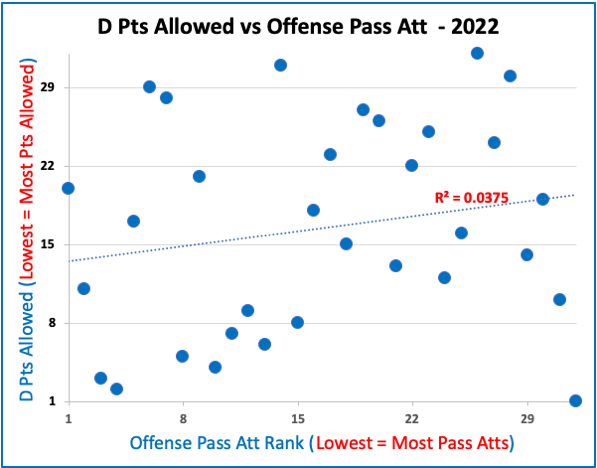
While pass attempts were lower for these bad-defense teams, was that because they didn’t get on the field much? Yes – it’s no surprise that teams with the worst defenses run fewer plays. The scatter plot below shows defensive points allowed vs. offensive plays per game.
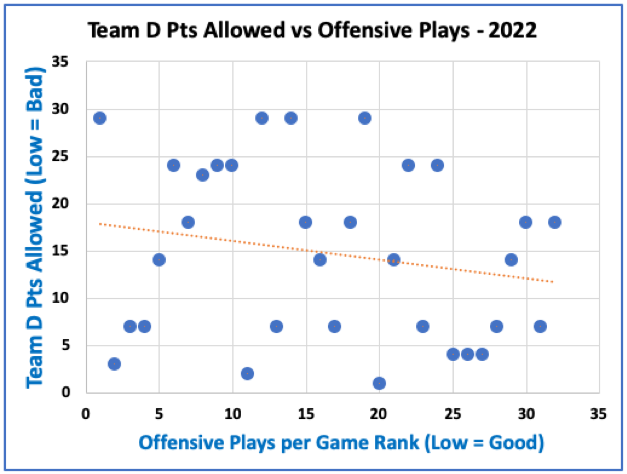
The obvious conclusion is that teams with bad defenses would need to pick up the pass attempts to try and stay in games. Bad defense teams should skew pass-heavy in catch-up mode, right? I was fascinated and surprised to see that, no, teams that gave up the most points did not tend to have a higher pass rate than teams who gave up fewer points. The scatter plot below shows team points allowed vs. percent of pass attempts.
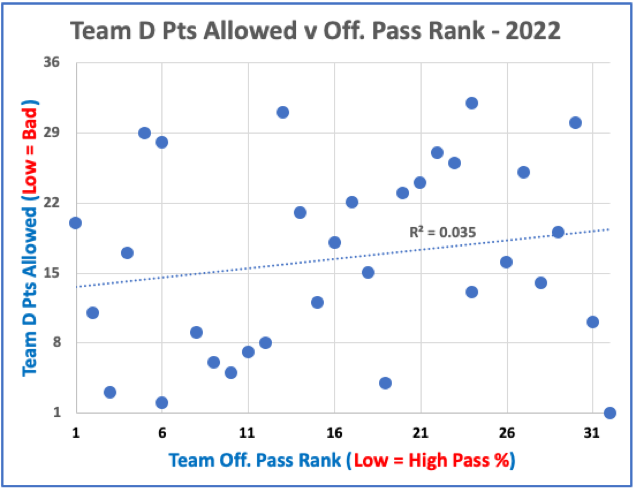
Some teams with the worst defenses like Chicago (that lone little dot in the lower right in the chart above) gave up a ton of points but barely threw the ball. In the Bears’ case, part of that was because of their lack of receiver talent, but part of it was that running was their only way to try to keep the games close.
Wide Receivers in Garbage Time
So if WR opportunity wasn’t higher on the teams with the worst defenses, did their WRs at least compile garbage time fantasy points? Let’s take another look. The chart below shows the number of top-36 receivers on each team grouped by how many points their defenses allowed.
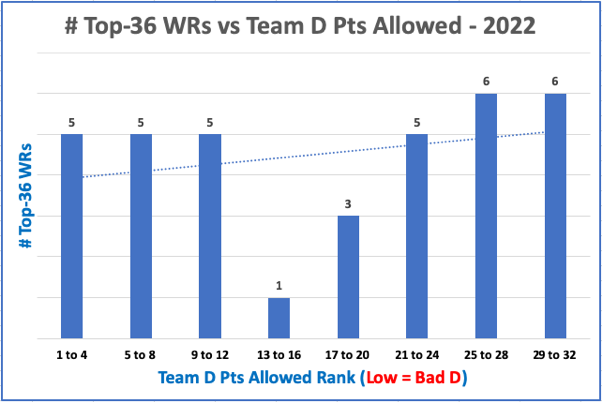
Yet again, the data shows no more top-36 WRs on the bad defense teams. Surprisingly again, there was more WR scoring on teams that gave up the least points. That also goes against the idea that teams with the best defenses are satisfied running out the clock. It looks like modern NFL teams go for the jugular and pile on the scoring whenever they can.
One last look at the data from 2022…could at least wins and losses serve as a proxy to point us to those ever-elusive garbage-time WR points? The following chart shows the number of top-36 receivers on each team based on their team win totals.
No, for one last time, WRs on teams with the worst offenses were a longer shot than WRs on better teams. There just didn’t seem to be a garbage-time fairy waiting to give us 2022 fantasy points on the cheap.
2021 Garbage Time Data
All of the above looked at 2022 data. Could 2022 have been an outlier? Let’s take one final look at defensive points allowed vs offensive pass attempts, this time for 2021:
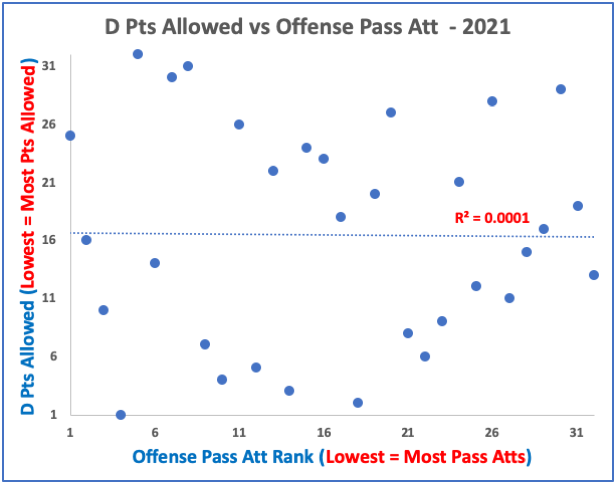
2021 was even more extreme. In 2021, there was literally zero correlation between a team’s defensive points allowed and offensive pass attempts. As was the case in 2022, the most 2021 top-36 WRs also came from teams with the best defenses.
The Exception
Of course, we don’t want to avoid every WR on every team with a bad defense. Look no further than Justin Jefferson. An interesting and consistent exception comes from rookies on bad defense teams. From Jefferson to Ja’Marr Chase to Jaylen Waddle and Amon-Ra St. Brown, rookie WRs – especially those drafted early – can and do immediately step in and score fantasy points regardless of situation. And the ones that do break through, you will want to hold.
Takeaways
Let’s look at some takeaways from the fantasy scoring data reviewed above.
- WR scoring in garbage time isn’t reliable enough on its own to cause us to target WRs on teams with bad defenses.
- Teams with the worst defenses don’t tend to throw more often or score more fantasy points than the teams with better defenses.
- We shouldn’t avoid the teams with bad defenses altogether, but we shouldn’t spend much time looking beyond their top, established WRs for garbage time scoring.
- A WR2 like a Brandon Aiyuk, can be a much better fantasy bet than a WR1 on Arizona, Indianapolis or Houston.
- Rookies are the exception. Given early opportunities, they can score fantasy points even on the worst teams and, once established, can remain viable. Marvin Mims, Michael Wilson and Jordan Addison are really interesting options for 2023.
Based on this data, the oft-cited garbage time scoring is a myth. Teams with bad defenses may be playing catch up, but having a bad defense doesn’t automatically make their offenses more productive.

